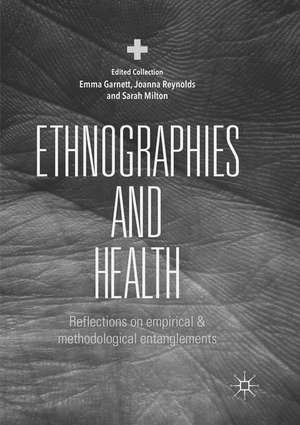Ethnographies and Health: Reflections on Empirical and Methodological Entanglements
Editat de Emma Garnett, Joanna Reynolds, Sarah Miltonen Limba Engleză Paperback – 31 ian 2019
| Toate formatele și edițiile | Preț | Express |
|---|---|---|
| Paperback (1) | 1091.50 lei 43-57 zile | |
| Springer International Publishing – 31 ian 2019 | 1091.50 lei 43-57 zile | |
| Hardback (1) | 1097.54 lei 43-57 zile | |
| Springer International Publishing – 11 iul 2018 | 1097.54 lei 43-57 zile |
Preț: 1091.50 lei
Preț vechi: 1148.94 lei
-5% Nou
Puncte Express: 1637
Preț estimativ în valută:
208.92€ • 227.01$ • 175.61£
208.92€ • 227.01$ • 175.61£
Carte tipărită la comandă
Livrare economică 21 aprilie-05 mai
Preluare comenzi: 021 569.72.76
Specificații
ISBN-13: 9783030077594
ISBN-10: 3030077594
Pagini: 275
Ilustrații: XIII, 275 p. 2 illus.
Dimensiuni: 148 x 210 x 12 mm
Greutate: 0.35 kg
Ediția:Softcover reprint of the original 1st ed. 2018
Editura: Springer International Publishing
Colecția Palgrave Macmillan
Locul publicării:Cham, Switzerland
ISBN-10: 3030077594
Pagini: 275
Ilustrații: XIII, 275 p. 2 illus.
Dimensiuni: 148 x 210 x 12 mm
Greutate: 0.35 kg
Ediția:Softcover reprint of the original 1st ed. 2018
Editura: Springer International Publishing
Colecția Palgrave Macmillan
Locul publicării:Cham, Switzerland
Cuprins
1. Introduction: Entangling Ethnography and Health.- 2. Working through Ethical and Emotional Concerns and Uncertainties in Ethnographic Research with People with Learning Disabilities.- 3. Virtual Ethnography of HIV Positive Health Status in Gay Virtual Intimacies in Serbia.- 4. Ethnography and Ethics in Your Own Workplace: Reconceptualising Dialysis Care from an Insider Nurse Researcher.- 5. Using an Ethnographic Approach to Study End-of-Life Care: Reflections from Research Encounters in England.- 6. An Occupational Therapist Ethnographer on an Acute Medical Unit: Using Reflexivity to Understand Situational Identity and the Weight of Expectation.- 7. Shaping the Field: A Reflexive Account of Practitioner Interference during Ethnographic Fieldwork in Radiotherapy.- 8. Symbolic, Collective and Intimate Spaces: An Ethnographic Approach to the Places of Integrated Care.- 9. Temporality and the Intersections between Ageing, Gender and Wellness: Reflections from an Ethnographic Study in Salsa Classes.- 10. Caring with Others: Constructing a Good Life with Incurable Illness.- 11. “What Sort of Jumper Is That, Your Wife Has Terrible Taste Mate.” Exploring the Importance of Positionality within Ethnographic Research Conducted alongside a Public Health Programme in Three Scottish Prisons.- 12. Ethnographic Encounters with the ‘Community’: Implications for Considering Scale in Public Health Evaluation.- 13. “To Uninstall Oneself”: Ethnographizing Immunostimulants for Autoimmunity in Brazil.- 14. Knowledge Infrastructures of Air Pollution: Tracing the In-Between Spaces of Interdisciplinary Science in Action.- 15. Towards a Pragmatics of Health.
Notă biografică
Emma Garnett is a Research Fellow at the School of Population Health & Environmental Sciences at King’s College London, UK. Her ethnographic work has explored the socio-material practices of research in environmental health science and citizen science. She has published on interdisciplinarity, big data and post-humanist approaches to global health.
Joanna Reynolds is an Assistant Professor in Social Science at the London School of Hygiene & Tropical Medicine, UK, and an Honorary Research Fellow at the University of Sheffield, UK. She has a background in social anthropology and public health, and her current research interests include health inequalities, the making of public health knowledge through evaluation, and the fringes of ‘health’ and its intersections with other domains of policy and decision making.
Sarah Milton is a Research Fellow in Medical Anthropology at the London School of Hygiene & Tropical Medicine, UK. Her interests are in ageing, gender and local practices of public health in the UK. She has published on later life sexualities, and ageing, wellbeing and welfare in the context of austerity.
Textul de pe ultima copertă
This edited collection explores the multiple ways in which ethnography and health emerge and take form through the research process. There is now a plethora of disciplinary engagements with ethnography around the topic of health, including anthropology, sociology, geography, science and technology studies, and in health care professions such as nursing and occupational therapy. This dynamic and evolving landscape means ethnography and health are entangled in new and different ways, providing a timely opportunity to explore what these entanglements do and affect in the social production of knowledge. Rather than discussing the strengths (and limitations) of ethnography for engaging with health, the book asks: what does ethnography enable, make visible and possible for knowing and doing health in contemporary research settings and beyond?
Caracteristici
Offers original contributions to knowledge on ethnography as a research method
Spans disciplines and compliments the literature on more positivist methods of health research
Highlights the possible transformative effects of using ethnography to inform policy and practice
Spans disciplines and compliments the literature on more positivist methods of health research
Highlights the possible transformative effects of using ethnography to inform policy and practice
